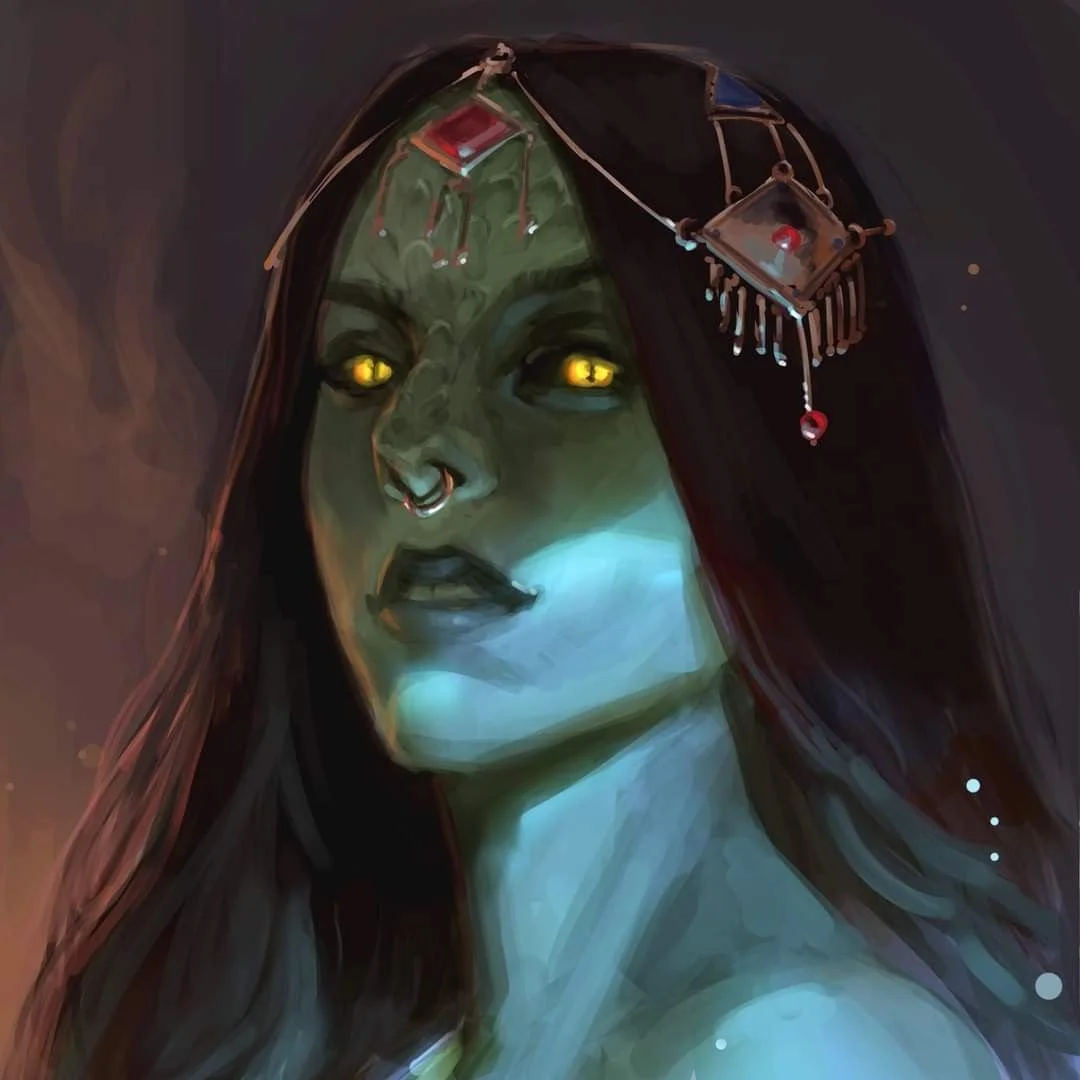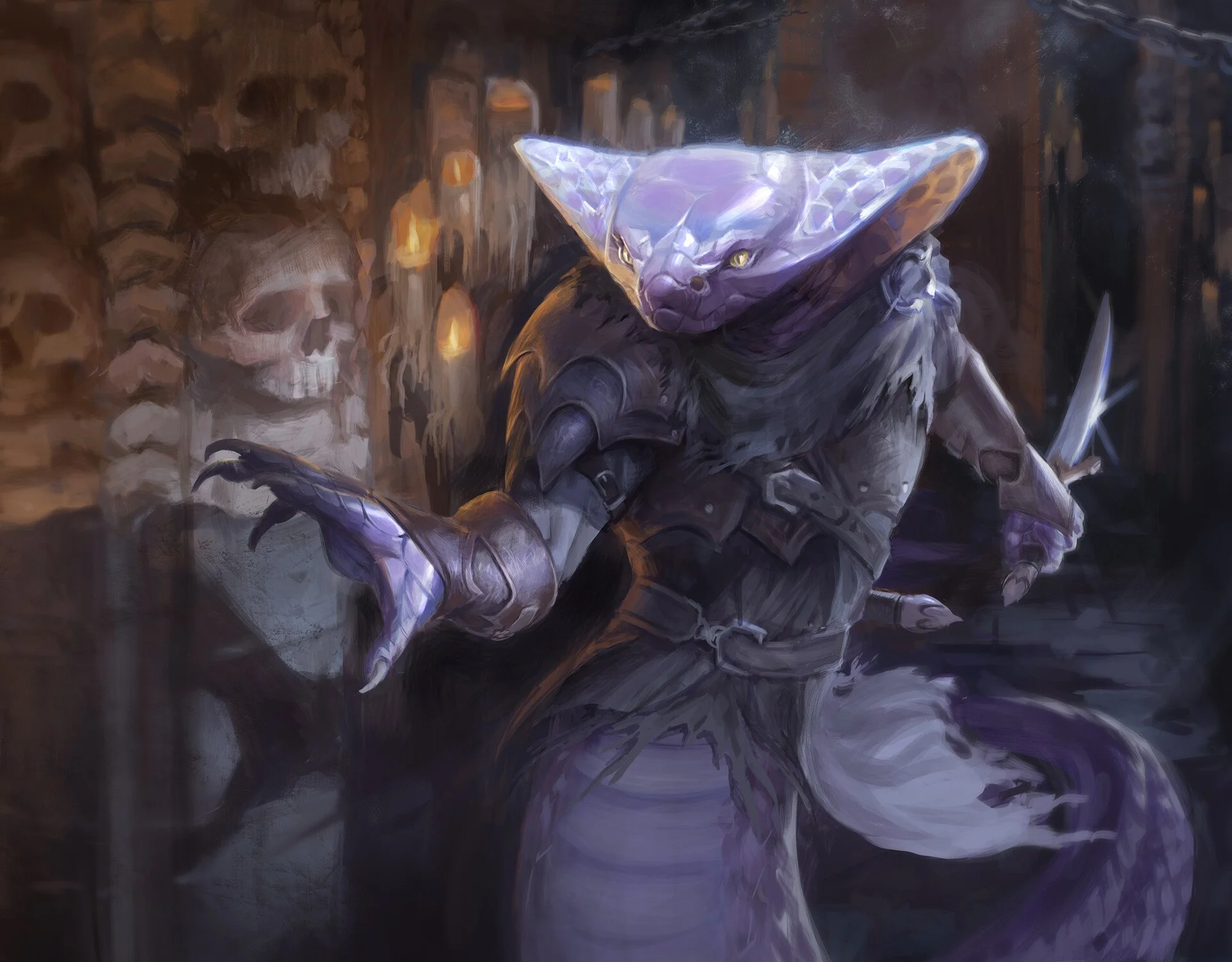Concerning the Yuan-Ti
The Yuan-Ti are descendants of the Palash who first conquered Worrel many thousands of years ago. They were the offspring of Palash who were corrupted by dark creatures fueling the greed of short-lived humans. While the Palashan empire continued to grow in might, the incipient Yuan-Ti were some of the most fierce warriors with the most advanced philosophy of the realms. The grew so bold as to challenge the morality of the other races and became detached from emotion, instead focusing on clear thought unbridled by morality and intensely calculating for what is best for them.
The serpent gods learned of these human and approached them in the darkness. These Palash then began worshiping the serpent gods in search of perfecting themselves into beings of ultimate power and strength. The began practicing cannibalism and sacrifice, and this departure marks the first empire of the Yuan-Ti from the Palash. With magic they bred with snakes to approach the serpent god forms and attain a pinnacle state of being.
With the shedding of their human form, the Yuan-Ti saw themselves transcended from the frail form of their humanity, like a snake shedding its skin. Those that did not transform were consumed or enslaved. A brutal civil war saw the Palashan empire battle the Yuan-Ti empire with neither yielding to the other. The true victor of their war were the dwarves of Oronad, and the Yuan-Ti were left in the southern portion of Worrel to their own devices.
Modern Yuan-Ti do not possess or understand human emotions, seeing sentiment only as an exploitable weakness. They call themselves the Noshkosi. A Yuan-Ti sees the world and the events of its own life with such extreme pragmatism that it is nearly impossible to manipulate, influence, or control by non-magical means, even as it seeks to control others through terror, pleasure, and awe. The ruling class understand that to return to their prior glory will require more strength than they currently possess, so they yielded to the rule of the Maergan family in a pseudo-alliance which is governed by careful stipulations that the Yuan-Ti would continue to operate independently within their own territory, continuing their tradition of cannibalism and sacrifice as long as it does not affect the true citizens of the realm.
It's a distasteful treaty to Maerwald and an even more resentful one to the Yuan-Ti who see themselves as greater than the weak empire which now rules them. But they survive, seek greater power, and bide their time. They officially act in an honorable manner with an embassy in Castellan, doing what they can to help "protect" the region from mountain threats. They continue to worship the old gods in secret to attain greater power, but they have no love for their gods. They seek to gain enough power to replace them. They strive for ascension and are willing to commit atrocities to achieve it.
With the Kingdom of Maergan busy dealing with the gnoll threat and the plague in the North, the Noshkosi have grown bolder and began openly taking slaves from nearby settlements, being sure to limit witnesses. The Noshkosi have been secretly building alliances with Underdark kingdoms, building an army, and preparing to overthrow the Maergan family. They've positioned spies and ambassadors into the government of Maerwald to stay informed of current events. Anytime something drew the attention of King Obadon, the Noshkosi were always trying to root out "cults" that they themselves were behind. It isn't such a masterplan as it is the rulers allowing the other nobility to gain more power, but if they are discovered because they were not smart enough to manipulate or cover their tracks, then the Noshkosi eliminated them and gave their bodies to Maerwald.
The fringes of the Noshkosi lands were riddled with purebloods and other races co-mingling, forming humanoids with even fewer serpentine features. These lesser Yuan-Ti were not even considered part of the caste of the Noshkosi and were called Hatzsakosh. They possess human emotions but had a fondness for snakes and possess a subtle serpentine grace. Their dancers were some of the most renown in the realm and often entertained the nobility in Castemar. The Hatzsakosh were technically full citizens of Maerwald, but the did whatever the Noshkosi said and were then left alone. Further into the empire, slaves of Hatzsakosh origin were common.

